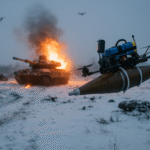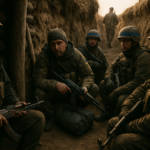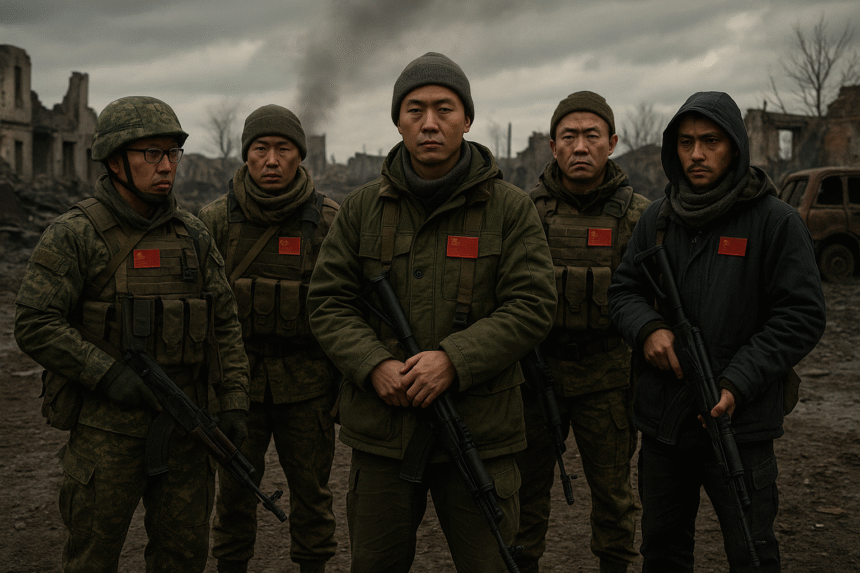Russia-Ukraine War Insights: Report Summary
The war in Ukraine has shattered complacent illusions about modern conflict. RAND’s landmark study, “Russia’s War in Ukraine: Emerging Insights for UK and NATO Joint Doctrine,” lays bare the hard truths that NATO and Britain must confront. Russia-Ukraine War Insights reveal an unforgiving reality: survival demands immediate, radical adaptation.
“Neither manoeuvre nor positional warfare have led to decisive outcomes. Claims of either approach’s demise are premature.” – RAND, 2024
Old Tactics, New Tech: A Brutal Hybrid
Ukraine’s frontlines tell a stark story. Trench warfare and artillery barrages collide with drone swarms and satellite-guided strikes. RAND confirms what Ukraine’s soldiers already know: technology accelerates the pace of battle but does not erase war’s brutal fundamentals.
Russia-Ukraine War Insights show that innovation creates new complexities without removing the old horrors of attrition and endurance.
Hide or Die: Total Battlespace Transparency
No army can expect to hide. Civilian satellites, smartphone signals, and drone surveillance have rendered the battlefield naked. Survival now demands dispersion, camouflage, deception, and relentless movement.
RAND’s findings emphasise that armies that fail to adapt to transparency will suffer visible deaths.
“The war has demonstrated the acute vulnerability of large, immobile and high-signature C2 nodes.” – RAND, 2024
Mass Over Precision: The Return of Scale
Precision strikes can weaken an enemy. They cannot replace mass. Ukraine’s experience reminds us that wars are won by those with deeper stockpiles, greater manpower, and stronger industries.
Russia-Ukraine War Insights make it clear: NATO’s lean forces must grow or risk collapse in any prolonged confrontation.
Doctrine Remains Sound; Forces Do Not
RAND’s analysis offers a rare reassurance: NATO’s operational doctrine remains fundamentally sound. Yet, without the material resources to execute it under modern attritional conditions, doctrine alone cannot win wars.
“The most pressing question is not whether NATO doctrine is appropriate, but whether sufficient resources exist to implement it.” – RAND, 2024
Without mass, readiness, and industrial depth, even the best strategies will shatter on the battlefield.
Adapt or Perish: Tactical Innovation at War’s Edge
In Ukraine, adaptation often decides between life and death on a daily basis. New kill chains form in minutes. Drone warfare evolves weekly. Cyber disruptions strike unpredictably.
Russia-Ukraine War Insights warn that fast-adapting enemies will outpace, outgun, and defeat slow-moving military bureaucracies.
Industrial Mobilisation: Europe’s Last Chance
RAND’s report issues an unmistakable call: Europe’s defence industry is not prepared for the scale of war now visible. Mobilisation must become a matter of national urgency.
Stockpiles must expand. Production must surge. Political will must match wartime realities.
“The military effort cannot be divorced from industrial and societal mobilisation in times of war.” – RAND, 2024
Failure to rearm in time could mean failure to survive.
Air Superiority No Longer Assured
The air above Ukraine is a killing ground, not a sanctuary. Missiles, drones, and ground-based defences dominate.
RAND’s findings hammer home: the traditional assumption of air supremacy is dead. Future control of the skies will demand new doctrines, new weapons, and new thinking.
“The primacy of land operations without air power has made breakthrough extremely costly.” – RAND, 2024
Strategic Culture: Understand or Fail
Deterrence depends on comprehension. RAND reveals how the West’s misreading of Russia’s strategic culture contributed directly to deterrence failure in 2022.
NATO must relearn that understanding an adversary’s fears, ambitions, and worldview is not optional — it is existential.
Total Mobilisation: The New Precondition for Victory
Wars today demand the commitment of entire nations. Ukraine’s survival is not just a military success; it is a national mobilisation triumph.
Britain, Europe, and NATO must plan to fight not just with armies, but with economies, industries, and societies fully engaged.
Conclusion
Russia-Ukraine War Insights deliver a brutal but necessary warning: Europe’s old illusions are dead. The future demands action, not hollow talk of resilience or empty strategies on paper. Free nations must secure survival through mass, endurance, industrial power, and an unbreakable will to resist.
Yet it is crucial to understand the deeper truth: the war between Ukraine and Russia is a kinetic war, fought openly with artillery, tanks, and drones.
The war between Russia and NATO, however, is a hybrid war already raging inside our societies.
Russia fights this war through disinformation, weaponised migration, economic sabotage, cyber attacks, and relentless assaults on political will. Their strategy aims to collapse us from within, not destroy us from without.
Scale, stockpiling, and rearmament are necessary — but they are not enough. They prepare us for tomorrow’s open battles, not today’s hidden war.
Support Civilian Intelligence
The real front lines today are cultural, informational, and societal. And it is already under siege.
At Frontline Europa, we do not wait for the enemy to announce itself. We expose the siege already underway — across our borders, across our airwaves, and within our institutions.
We believe in a Europe that stands, not one that kneels.
If you believe Europe must resist, not surrender, then stand with us.
Share this article, spread the truth, and donate to Frontline Europa to fuel the fight for honest news, absolute sovereignty, and real resilience.
The frontline is already here. And it is ours to hold.






